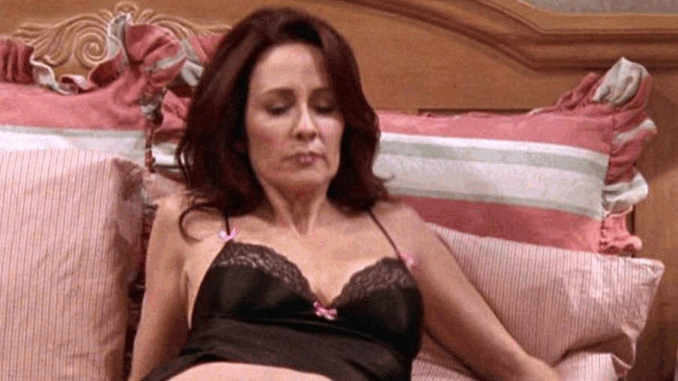
Casting a major sitcom is rarely smooth. But in the case of Everybody Loves Raymond, the selection of Patricia Heaton as Debra Barone came with its own drama. From network pressure to creator push‑back, this was more than “let’s pick an actress.” It was a clash of vision, ego, chemistry, and identity. In this article, we’ll explore exactly what went on behind the scenes, why the drama matters, and how it shaped the show we came to love.
The Show and The Role: Debra Barone
Everybody Loves Raymond premiered in 1996 and ran for nine successful seasons. At its heart: Ray Barone, his wife Debra, their children, and the overbearing Barone parents across the street. Debra, as played by Patricia Heaton, became the voice of reason, frustration, and comedic resilience. The role required wit, warmth, and real-life relatability.
Network vs. Creator: Who Should Play Debra?
Series creator Phil Rosenthal revealed that the network had a very different idea of who Debra should be. Executives reportedly wanted a “hotter” actress to fit a certain cast aesthetic. Rosenthal resisted. He felt a miscast would damage the chemistry and authenticity of the show. He said he was ready to walk away from the project rather than cast against his instincts.
How Patricia Heaton Entered the Picture
Patricia Heaton wasn’t the network’s first choice. She auditioned after other actresses were being considered. When she read for the part, it was evident within minutes that she was Debra. Her audition chemistry with Ray Romano sealed the deal. Rosenthal described her performance as perfect for the role—relatable, real, and capable of grounding the show.
Why the Drama Was Real: Creative Control and Image
The tension stemmed from differing visions: the network wanted Debra to fit a more traditional glamorous image, while Rosenthal wanted authenticity. The conflict was about whether Debra should be glamorous or grounded, someone audiences could truly relate to. Rosenthal’s insistence on authenticity created the clash with network executives.
Chemistry Matters: Ray and Debra’s Dynamic
Casting isn’t just about looks—it’s about chemistry. Heaton’s dynamic with Romano had to feel natural and believable. The network’s earlier picks reportedly lacked this connection. Heaton’s energy, timing, and relatability helped anchor the show, making her the perfect Debra.
The Pressure On Patricia Heaton
Because she was chosen amidst discord, Heaton entered the role under pressure: to prove the show’s vision right, satisfy critics, and live up to both network and creator expectations. She later admitted that when she auditioned, she instinctively embodied Debra’s frazzled, juggling style, giving her an edge.
What If The Network Had Won?
It’s fascinating to consider: if the network’s preferred actress had been cast, would the show have resonated the same way? The drama of the casting decision underscores how critical the right match is in sitcom success.
How The Drama Influenced The Show’s Tone
Because Rosenthal fought for and secured Heaton, the show maintained a tone of grounded realism, avoiding glam-sitcom clichés. The behind-the-scenes struggle informed the show’s attitude: authentic, relatable, and funny. That tone resonated with audiences and contributed to its longevity.
Supporting Cast Tensions: Salary & On‑Set Friction
The casting drama wasn’t the only behind-the-scenes issue. Later in the series, salary disputes and cast tensions emerged. Some supporting cast members felt underpaid relative to Romano’s significant salary increases. Heaton, among others, reportedly even called in sick in protest during one dispute. These pressures show how off-screen decisions shaped the show.
Patricia Heaton’s Own Reflections
Heaton later reflected on how the role of Debra shaped her image—one of frustration, anger, and sacrifice. The casting drama arguably added weight to her performance, allowing her to channel real tension into her portrayal of Debra.
Lessons For Casting Directors & Creators
-
Trust chemistry over appearance or fame.
-
Stick to the creative vision even under network pressure.
-
Authenticity resonates with audiences more than superficial glamour.
-
Behind-the-scenes drama can significantly impact the show’s tone and longevity.
Why Viewers Might Never Fully Know
While reports exist about the casting struggles, the full details of studio meetings and contract negotiations remain private. What emerges on-screen is Heaton as Debra, a role that became iconic. The unseen drama ultimately contributed to the authenticity that fans loved.
Conclusion
The story of Patricia Heaton’s casting on Everybody Loves Raymond demonstrates the importance of integrity, chemistry, and creative conviction in television. The behind-the-scenes drama wasn’t just gossip—it was a turning point that shaped one of the most beloved sitcoms of its era. Without this battle, the show might have looked very different. Heaton’s Debra Barone stands as proof that sometimes the messy parts behind the camera create the magic on-screen.
FAQs
Q1: Why did CBS originally want a different actress for Debra Barone?
A1: The network reportedly preferred someone with a more glamorous or traditionally “hot” image for the role, believing it would appeal to a wider audience.
Q2: What made Patricia Heaton stand out in her audition?
A2: She brought authenticity, relatability, and the right chemistry with Ray Romano, perfectly capturing Debra’s character traits.
Q3: Did the casting drama affect the show’s production?
A3: Yes, the disagreement was intense enough that creator Phil Rosenthal considered leaving the project if Heaton wasn’t cast.
Q4: How did salary disputes relate to the casting issues?
A4: While casting was about the right fit, later salary tensions reflected broader issues about fairness and value within the cast.
Q5: What can modern TV creators learn from this story?
A5: Sticking to your creative vision, valuing chemistry, and prioritizing authenticity can result in lasting success despite behind-the-scenes pressure.
